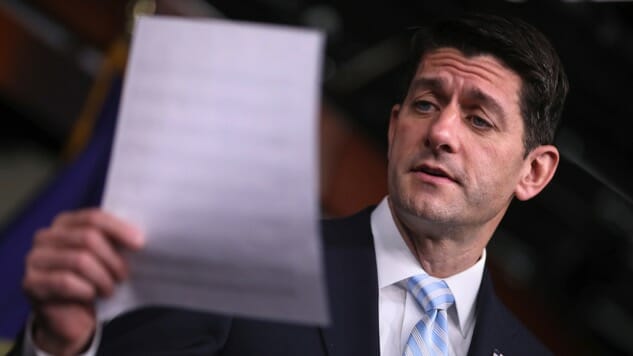How the AHCA Will Gut Medicaid and Devastate the Poor
Photo by Chip Somodevilla Politics Features Health Care
In accordance with Republicans’ longstanding goal to shred what remains of the social safety net, their “replacement” for Obamacare—endorsed by President Donald Trump and House Speaker Paul Ryan—includes among its many awful components the slow-motion gutting of Medicaid. Although the so-called American Health Care Act, currently in the process of working its way through the House of Representatives, would not eliminate Medicaid outright, the GOP’s healthcare plan would reduce the program to a sickly, inadequate shadow of its former self, one woefully unequipped to meet many of its most basic functions.
The funding cuts to states that chose to expand Medicaid under the Affordable Care Act would only be the tip of the iceberg. The human cost of gutting Medicaid, in the process lavishing tax cuts on the rich, would have a devastating human impact on the millions of low-income individuals and families who rely upon the program for medical care, including such vulnerable demographics as children, pregnant women and disabled adults. Joan Alker, the executive director of the Center for Children and Families at Georgetown University, told The New York Times that changes to Medicaid would be “potentially more major than repealing the Affordable Care Act.” Certainly, the two overlap; 20 million Americans gained healthcare through the Affordable Care Act’s Medicaid expansion.
Medicaid, which provides healthcare coverage for 74 millions Americans, is currently funded by a combination of state and federal dollars according to a match rate system. That is, for every dollar a state spends on Medicaid, the federal government reimburses it the same amount. Contrary to conservative dogma, Medicaid spending is highly efficient and highly adaptable. Should a state need a sudden infusion of cash to deal with a medical emergency—say, a disease outbreak—the current system allows the federal government to provide immediate funding for Medicaid without the need to deal with Congressional red tape (such as Republicans who oppose federal spending even in times of crisis).
The American Health Care Act would cap spending on Medicaid by financing it with a per capita block grant, a longtime dream of Republicans seeking to gut the program. Instead of matching state Medicaid spending dollar for dollar, the federal government would provide a lump sum to each state, capping spending rather than matching it. This provision of the law would take effect in 2020, cynically kicking the can down the road for a future Congress to deal with and helping the bitter pill of Obamacare repeal go down easier.
While the lump sum will be indexed to inflation according to some as yet undefined formula, it is highly unlikely it will rise fast enough to cover necessary investments in new medical treatments, disease outbreaks and natural disasters. Without sufficient funding from the federal government, states will be forced to cut Medicaid spending despite obvious risks to public health. David Grabowski of The Daily News writes:
“Medicaid currently constitutes about 15% of overall state spending. Many states are experiencing budget shortfalls, partly due to the high cost of Medicaid. Thus, the idea that states have additional funds to devote to Medicaid is very dubious. More likely, states will deal with this cut by passing the higher costs on to beneficiaries and providers. In terms of beneficiaries, the result will be reductions in eligibility, more limited coverage, narrower provider networks and fewer benefits.”
Without the Affordable Care Act’s mandate to cover essential health benefits, budget cuts will devastate substance abuse and mental health treatment programs. This, in the midst of a massive opiate crisis sweeping the nation and a shameful lack of funding for the treatment of the 42.5 million Americans who suffer from mental illness.
It is telling that President Trump is eager to gut Medicaid, which comprises one-sixth of healthcare spending in the United States, while promising to leave Social Security and Medicare, which make up a far greater share of government spending, intact. Although Paul Ryan and other “fiscal hawks” have made it clear that they would be happy to go after the latter two programs as well, Donald Trump is politically astute enough to realize that this would alienate his white working class base who think they, not the lazy “others” who benefit from means-tested programs, are entitled to “earned” government benefits.
So as a compromise, the Trump and Ryan wings of the party wage class warfare on low income Americans that they do not consider to be deserving of help, ignoring the systemic causes of poverty in favor of a cruel, blame-the-victim mentality that has defined American conservatism for a generation. Trump does not even pretend to be concerned with balancing the budget; he is more than willing to ramp up military spending and fund a massive, corporate-friendly infrastructure package. No, for Trump, gutting Medicaid is not a matter of fiscal ideology, but an attack on those who benefit from it. Progressives have a moral responsibility to do everything in their power to stand up for Medicaid, one of the hallmark achievements of the Great Society, at a time when a hard-right government is intent on rolling it back.